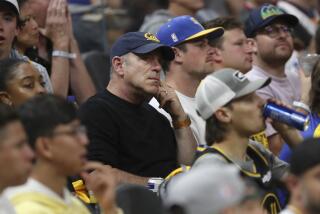It’s Not Radical, but . . .
- Share via
BALTIMORE — In a move that likely will result in Kansas City or Milwaukee switching to the National League next season, baseball owners finally approved a realignment plan Wednesday.
Detroit will go from the AL East to the AL Central, and the expansion Tampa Bay Devil Rays will replace the Tigers in the AL East. The AL team to switch leagues will be designated after the World Series, and owners and officials said the Royals had first choice. If Kansas City declines, Milwaukee has agreed to move, they said.
“We did support radical realignment, but this does not appear to be radical realignment,” Royal General Manager Herk Robinson said. “I would say this is more of an adjustment that a realignment. But I cannot speak for [team chairman] David Glass or the board.”
Owners approved the plan, 27-0, during a conference call shortly before Game 6 of the AL championship series. The San Francisco Giants, who threatened to sue to block a larger realignment plan, abstained, and the two 1998 expansion teams were not allowed to vote.
“We have taken care of the two most immediate concerns, moving Tampa Bay into a more agreeable geographic division and creating a 16-14 league alignment,” said acting Commissioner Bud Selig, who also owns the Brewers.
Tampa Bay had spent months trying to avoid an assignment to the AL West, the only open division spot last January. Arizona was put in the NL West during the January vote, and the Tigers said they were willing to switch to the AL Central, but Kansas City refused to move from the AL Central to the AL West, forcing the debate to drag on for nine months.
“This is a dream come true. This is a great day for Tampa Bay,” Devil Ray owner Vince Naimoli said. “Our fans were really focused on being in the American League East. And we’ll have great interleague rivalries with the Marlins and Atlanta.”
With the switches, the NL will have 16 teams next season and the AL 14. That enables owners to bunch interleague games into specific periods of the season, as was done this year, the initial season of interleague play.
Under the 15-15 format owners approved in January, an interleague game would have been needed nearly every day to keep teams from having days off on weekends.
Selig would not comment on the Brewers’ choice in the event Kansas City declines to move.
“I wouldn’t say anyone has first choice. We have a significant number of options,” he said.
Selig initially had pushed for radical geographic realignment, in which 15 teams would have switched leagues.
When that plan failed to gain enough support, he backed a seven-team proposal in which the four AL West teams would have gone to the NL in exchange for Florida, Montreal and another team, possibly Houston.
San Francisco threatened to sue to block that, claiming a move of Oakland to the NL would have violated its exclusive NL rights to the Bay area. In addition, the players’ association, not wanting the AL to lose its nationwide exposure, also opposed the plan, threatening to stop interleague play after the 1998 season.
As part of the resolution, owners extended their special voting requirements for realignment, due to expire Wednesday, through Oct. 31, 1998. Giant owner Peter Magowan tried to get that out of the resolution, and abstained after his attempt failed.
Selig said Wednesday’s vote was only the first step, that he envisioned additional switches for 1999 or beyond.
“We have conducted extensive research since the process began in January, and it shows that our fans want more significant realignment, and so do our clubs,” Selig said.
Magowan wasn’t so sure.
“Who knows? This thing might die of its own weight,” he said. “I don’t think there’s that much support for grand realignment.”
More to Read
Go beyond the scoreboard
Get the latest on L.A.'s teams in the daily Sports Report newsletter.
You may occasionally receive promotional content from the Los Angeles Times.










